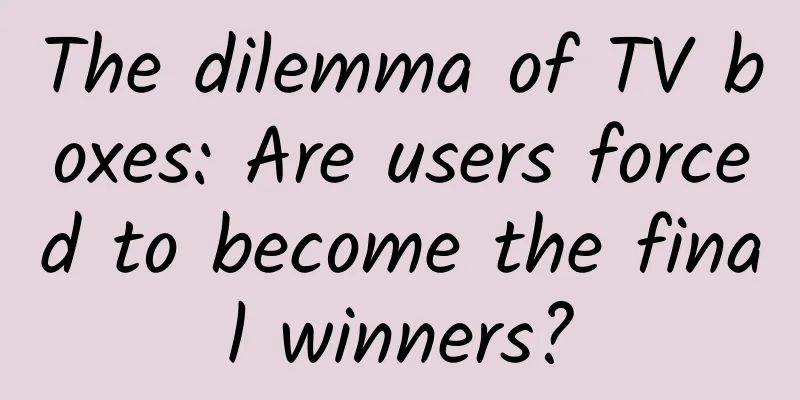The dilemma of TV boxes: Are users forced to become the final winners?

|
In just three months, the TV box was sentenced to death, and sales instantly plummeted from the hot ten million level in half a year to a bleak situation where no dealer dared to stock up and sell. But unlike Nokia’s sudden fall, the rise and fall of the box was not determined by users and the market. Since June this year, the boxes have been named by the State Administration of Radio, Film and Television several times, from requiring the cessation of the time-shifting and playback functions of TV programs provided in the TV boxes to ordering the closure of download channels for various video apps, video aggregation software, and Internet browser software in the TV boxes. So much so that in the content presented by TV boxes recently, we can no longer see the surprises that Internet TV brought to users a few months ago. The stereotyped boxes have become like a TV station with no highlights. In this rectification carried out in accordance with Document No. 181 of the Radio and Television Administration, the content homogeneity of TV boxes has become increasingly serious. The TV screen, which was originally expected to be reborn in the difficult transformation, has once again become a simple screen, a display screen with no prospects at all. In fact, in this ever-twisting “battle” between the Internet and the State Administration of Radio, Film and Television, almost everyone is a loser, except for the users. The statement by the head of the State Administration of Radio, Film and Television, “Why should we adapt to the Internet, rather than the Internet adapting to radio and television”, has become the best footnote to this battle with only losers. Although on the surface, those users who paid for Internet TV services but did not receive the due treatment are the biggest losers. But we should take a long-term view. In one or two years (maybe just a few months), those users who are forced to enjoy castrated Internet TV services will be the biggest winners in this rectification, along with Internet companies. The losers are the TV manufacturers currently deploying everywhere and the god-like General Administration. SARFT: Policy easing and tightening From the perspective of ideology and broadcasting safety, radio and television have always adhered to the principle of manageability and control over the ecology in their own territory. Some radio and television professionals believe that radio and television networks should be closed and controllable, and should not be commercialized, otherwise the broadcast content will be impossible to regulate. This argument is flawless. In fact, even in the United States, radio and television must be strictly controlled. With safety as the premise, in the past many policy evolutions of IPTV and three-network integration, the State Administration of Radio, Film and Television has always been able to firmly grasp the integration and operation of television content in its own hands, and firmly hold the power of life and death of practitioners in this field in its hands. In the continuous rectification of the Internet TV industry, the once very excited industry participants can also feel the omnipresence of this powerful aura. In other words, the General Administration is the air conditioner of this industry, hot and cold as it pleases; policies are the plasticine in the hands of the General Administration, which can be as wide or as narrow as it pleases. In short, if the General Administration loosens its policy valve a little bit, the industry will immediately jump to the branch with annual sales of tens of millions. If the policy is tightened a little, the industry will immediately fall into an ice cave. The curse tightening the entire industry is the "Operation and Management Requirements for Internet TV License Holders" commonly known as Document No. 181, which was issued in 2011. But the problem is that the time window for the rapid development of the OTT industry was exactly 2012 and 2013, when industry participants including video websites, TV manufacturers, and Internet companies such as Xiaomi and LeTV flocked in, and the industry was in its heyday. Despite numerous whitewashing excuses, no one can explain the arbitrary nature of the radio and television policies. If the market had not sensed the looseness of the policies after 2012, there would have been no participants in the industry. When the industry became increasingly prosperous, the General Administration, as the competent department, began to tighten the industry policies, which seemed like building a nest to attract the phoenix and then cooking it. Let me ask you, if the industry regulation had been as strict as it is today starting from Document No. 181 in 2011, would the fluctuations in this industry be as great as they are today? The reasons for the changes in the General Administration's policy from loosening to tightening are unknown. However, the data may provide some new ideas for the ambiguous attitude of the General Administration towards the Internet. In 2013, when Internet TV was shining, the total revenue of the national radio and television industry reached 373.488 billion yuan, of which fiscal revenue was 43.7 billion yuan, a year-on-year increase of 10.44%; actual revenue was 324.277 billion yuan, a year-on-year increase of 15.67%, a decrease of 2.56 percentage points from the previous year, and the growth rate was obviously slowing down. Radio and television advertising revenue reached 138.701 billion yuan, a year-on-year increase of 9.19%, a decrease of 3.93 percentage points from the previous year. The government is increasing its investment and the financial revenue of radio and television is increasing, but the actual revenue and advertising are both declining. For radio and television, the Internet, which is like a flood of mercury, is indeed not so friendly and lovely. Internet companies: from detour to temporary withdrawal The strong rectification measures taken one after another by the State Administration of Radio, Film and Television almost caught major Internet companies off guard. Whether in terms of the intensity of the measures, the content of the rectification, or even the user market after the rectification, the presence of Internet companies in this industry has been greatly reduced. An industry insider said that the closed Internet TV industry will become a closed industrial system that is not accepted by video websites, TV manufacturers, and users, and will be meaningless; and the ultimate outcome of the industry will be either the system kills TV, or TV subverts the system. In fact, in the constant roundabout way with the State Administration of Radio, Film and Television, Internet companies were forced to learn the "Eight Immortals Crossing the Sea, Each Showing Their Magical Powers". After the State Administration of Radio, Film and Television issued a clear order to all major video websites to prohibit the listing of TV apps, video apps were forced to re-list by "changing their names". Such actions were regarded by the Administration as acts of resistance that must be suppressed. Internet TV has lost the Internet, or it has made Internet companies clearly feel the vacillation and uncertainty of policies, and it has also scared the investors who were originally interested in entering the industry. Just like few people are investing in North Korea now, the trick of being legal today and confiscated tomorrow is not something that investors can afford. Financial scholar Liu Shuwei pointed out in a recent article on the investment environment that the style of regulatory authorities is very important. If regulatory authorities "lure you in like a smiling tiger, and then eat you up like a sheep, leaving no hair behind," investors will naturally flee, and the industry's innovation ability will be greatly reduced. However, will the Internet really give up the TV screen? The answer is obviously no. The Internet has become as important as water, electricity, and gas, and it will definitely not be alienated from it because of an order from the General Administration. On the contrary, once users' TV usage habits change, the power of the Internet will swallow up everything. User: Final Winner The situation in the Internet TV industry has evolved to the point where there are almost no winners. Although the State Administration of Radio, Film and Television has established absolute authority through policy swings, the Internet gene that made Internet TV famous has been eliminated and temporarily left the market. In the long run, its behavior is tantamount to cutting off one's own arm. After this rectification, the injured users will make their own choices. But those young users who have just started to get used to sitting in front of the TV will not leave the TV. They have too many screens to watch, too much content to choose from, and too many technologies to realize their own Internet TV. If the Internet TV is castrated, they will still cast the screen and use the TV as a monitor. It is no exaggeration to say that once young users form the habit of screen projection, the fate of televisions will not be much better than that of newspapers. From this perspective, for young users and Internet companies, this rectification is tantamount to a free market education activity, allowing users to spontaneously learn how to interact with TVs using mobile terminals. Because of the reorganization, users have learned a new skill, which is the biggest winner, a new skill that is sufficient to cope with any future changes, because after turning on the TV, users will not even touch the remote control. In front of the Internet, this rectification is an extremely ridiculous Maginot Line to the onlookers. In the era when the Great Wall was towering, the Chinese nation was also successfully invaded by foreign races countless times. High walls are not a solution, let alone a means. Don't try to resist the Internet. The Internet will not respond to any attack. The vast Internet will tolerate all prejudices and attacks. Do you remember the battle between Blu-ray and HDDVD standards? Who was the winner in the end? There was no winner. Sony's Blu-ray won the standard but did not win the market. The final outcome was that the Internet defeated the extremely clear Blu-ray with extremely unclear images. A bunch of Internet video companies successfully went public, while Sony was unable to recover. In front of traditional TV sets, the remote control of TV users is fully controlled by the radio and television. In front of traditional TV sets, users often watch what is on TV; in front of Internet TV, it is more likely that the TV will show what the user wants to watch. This return of initiative is an era of progress brought by the Internet. As the absolute operator of the entire industry, the SARFT should make good use of its control power under this development trend and save the nearly collapsed opening rate among young people by saving the user experience. This is the fundamental starting point of all rectification measures. BTV's "Health Hall" program has repeatedly set new ratings. Hasn't this signal failed to alert the industry operators? Is it really something worth being complacent about the large number of elderly viewers sitting in front of the TV? Similarly, Internet companies that are shifting from PC and mobile terminals to TV terminals should also recognize the special features of TV screens and, while opening up new user markets, truly transform content and applications into their own weapons.
Today, the entire Internet TV industry has become a thing of the past. It remains to be seen whether it can make a comeback. However, in the face of the user experience that urgently needs to be addressed, it is still worth an attempt by all industry participants. As a winner of Toutiao's Qingyun Plan and Baijiahao's Bai+ Plan, the 2019 Baidu Digital Author of the Year, the Baijiahao's Most Popular Author in the Technology Field, the 2019 Sogou Technology and Culture Author, and the 2021 Baijiahao Quarterly Influential Creator, he has won many awards, including the 2013 Sohu Best Industry Media Person, the 2015 China New Media Entrepreneurship Competition Beijing Third Place, the 2015 Guangmang Experience Award, the 2015 China New Media Entrepreneurship Competition Finals Third Place, and the 2018 Baidu Dynamic Annual Powerful Celebrity. |
>>: Foreign media reviews Windows 10: Seemingly compromising but actually ambitious
Recommend
The paradise of "mushrooms" is here! How many kinds of wild mushrooms are there in Yunnan? The answer is beyond imagination!
Recently, the Yunnan Provincial Department of Eco...
Methodology: Use the idea of creating a "hot product" to operate content
When doing content operations , most people hope ...
He gained 330,000 followers in one event, and used these 3 secrets to make his circle of friends explode!
As we all know, online activities, especially onl...
Advertising resources and process for promoting novels through iQiyi advertising!
Most novel advertisers have some problems when pl...
Exclusive interview with APICloud CTO Zou Da: A full-stack engineer forced out
[[137215]] In the era of mobile Internet, APP is ...
"Zero-carbon agricultural products": Ding! Please check your "new green menu"
Organic food, also known as ecological or biologi...
Tips for attracting new customers and retaining customers from Pinduoduo/Meituan and others!
High-quality cases cannot be hidden. I will updat...
The hot-blooded Jianghu chain game idle brick-moving project that sells for 1580 outside [detailed tutorial + idle script]
The hot-blooded Jianghu chain game idle brick-mov...
WeChat cannot send videos over 25MB? Three tips to fix it
As we all know, WeChat has a limit on the size of...
Double Eleven, e-commerce industry leverages marketing skills!
The National Day is coming soon. A group of marke...
Evidence of early human amputation appears here
December 3 is the International Day of Persons wi...
What should I do if my boss suddenly asks me to work on a community group? 10 steps to build a community from 0 to 1!
1. Let me start with three points that I think ma...
Is it expensive to produce Shihezi pet mini program? Shihezi Pet Mini Program Production Cost and Process
In order to better penetrate into various industr...
How to use data to optimize channel delivery and achieve user growth?
With the disappearance of the new population divi...
The Queen's Low-Absorption Popularity Leader "Queen's Trading System Course" Fourth Issue
To win this protracted battle, you will use a min...









